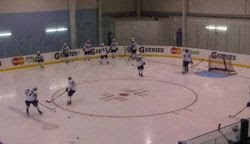
bad vibe from this guy.
Fehr may be a newcomer to the sport of hockey, but he's a well-known figure among North American sports fans. Fehr was in charge of the Major League Baseball Players Association for 24 years, a period that saw several work stoppages including the cancellation of the 1994 World Series.
While it's too early to know the impact that Fehr would have in his new role, we may be able to learn a few things from the way he got it. According to my sources, the NHLPA asked every potential candidate to fill out a simple one-page application form. I've obtained a copy of that form, and I think it sheds a lot of light on how Fehr managed to secure the job.
Thank you for applying for the position of Executive Director of the NHLPA. To help us determine your qualifications, please fill out this application form and hand it to the on-duty manager. Please note that only those applicants selected for an interview will be contacted.
First Name:
Last Name:
Does your name lend itself to any cool headline puns that describe how scary you are?
Please list your desired salary for this position:
Please list the percentage of that salary that you are willing to have randomly placed into an escrow that you do not understand:
Describe any previous job experience you have which would be relevant to a position at the NHLPA, such as working at a daycare or as a public safety investigator specializing in train wrecks.
Rate your knowledge of hockey on a scale of 1 to 10, where 1 is "poor" and 10 is "extremely poor".
Hours during the day that you are available to work:
Hours during the middle of the night that you are available to be fired:
List any experience you have in dealing with cripplingly short-sighted work stoppages. (Use the back of the paper if you need extra space.)
This is probably a long shot, but by any chance do you have experience working with uncharismatic, condescending and universally despised professional sports commissioners?
Please describe your level of expertise when it comes to hacking into an e-mail system.
If you wrote anything other than "absolutely none" for that last question, please crumple your application into a ball and toss it into the nearest waste basket.
Place a checkmark next to any of the following that you feel you would be able to acquire on behalf of the players:
( ) Two weeks of vacation during the regular season
( ) Four weeks of vacation during the offseason
( ) Twelve months of vacation during the 2012-13 season
Please look at the attached photo of Gary Bettman making his very best "intimidating face". Write down the total number of seconds you were able to stare at it without laughing.
It's a long story, but we're going to need the successful candidate to let Eric Lindros follow them around 24 hours a day, seven days a week. You're cool with that, aren't you? AREN'T YOU?
Any future threats of a work stoppage are likely to be extremely unpopular with hockey fans, many of whom would take it as a devastating betrayal on the part of a sport they've cared for deeply since childhood. How convincingly would you be able to fake caring about that?
Bonus grammar question: Why is it a "Players Association" in baseball, basketball and football, but a "Players' Association" in the NHL?
Finally, and most importantly: In the space below, please describe in detail how you plan to react when we all inevitably rise up and backstab you in 12 to 18 months.





















